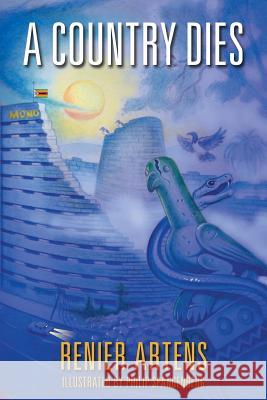A Country Dies » książka
A Country Dies
ISBN-13: 9781481808330 / Angielski / Miękka / 2013 / 318 str.
A young man returns to Rhodesia to experience the horrors and tribulations of a country at war with itself. Communist-trained and inspired terrorists, enabled by global politics of expediency, are relentless in their determination to overthrow colonial rule. The first victim is innocence; the last is the dream of an entire nation whose people simply wished to build their heritage and to live in peace. As a Ministry of Information Press Officer in Ian Smith's government Bill DeVries is a non-combatant in Rhodesia's Bush War. But like all Rhodesians he endures a deep sense of loss, betrayal and anger as the security of his cherished homeland is violated and steadily eroded. In time he finds love and summons up the courage to challenge new horizons, to start a new life in a country far removed from the land of his youth. But first he must come to terms with the inevitability of change and personal sacrifice while knowing that those left behind, or who choose to stay, will become hostages to the unfolding human tragedy since 1980 that so completely describes Zimbabwe today. "If you know anything about the troubles in African countries to the north since the end of colonialism...these weren't populist uprisings. There were political interests at work. Communist countries like Russia and China see an opportunity to sow dissension ... to exploit the power ambitions of a handful of like-minded minions. Their expectation is long-term which is to gain access to Africa's natural resources. So the African just ends up exchanging one set of masters for another that is much less benevolent. That's what I think will happen if they get majority rule in Rhodesia." - Bill DeVries. In 21st Century Zimbabwe, two-thirds of the roughly 12 million population lives below the poverty line. Outbreaks of cholera, typhoid and other diseases are common place. More than a million people are infected with the AIDS virus. Life expectancy at birth for males has declined from 60 to 42 years; in 2006 the life expectancy for men was only 37 years, for women a mere 34 years - the lowest in the world. The infant mortality rate has risen dramatically from 53 to 81 deaths per 1,000 live births since 1990 alone. Crop production has declined over the past decade anywhere from 70% to 300% and there is hunger throughout the land, mass starvation kept at bay only with the help of international food aid programs. About a quarter of the population, some 3.4 million Zimbabweans, have fled the country to become refugees in neighbouring South Africa, Zambia and Botswana. It is estimated there are a further one million displaced persons living in the country. In 2002 Zimbabwe was suspended from the Commonwealth of Nations on charges of human rights abuses. Violence, intimidation and fraud have been used as a matter of course during elections to keep the current regime in power. Ban Ki-moon, the UN Secretary General, is on record saying that Robert Mugabe is a dictator, and he has implied that the President should face criminal charges in the ICC for human rights abuses, especially in regard to the suppression of uprisings between 1982 and 1986. In the main, political and economic decision-making in Zimbabwe, as well as command of the Armed Forces, remain under the total control of the Zanu-PF politburo with Mugabe at its head. Sino-African relations are on the rise and China's influence on the continent grows steadily. Yet governments of the developed world, once again, stand mute while the suffering continues.
Zawartość książki może nie spełniać oczekiwań – reklamacje nie obejmują treści, która mogła nie być redakcyjnie ani merytorycznie opracowana.











